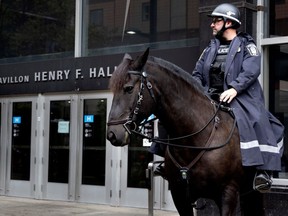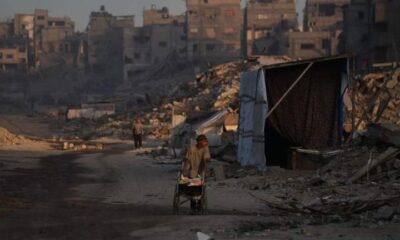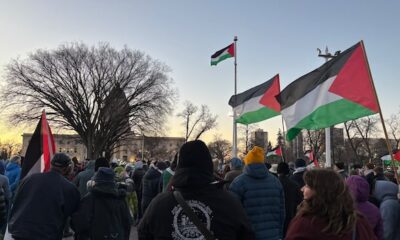Politics
Concordia University Closes Campus After Disruptive Protests

On October 6, 2023, a group of approximately 30 masked protesters disrupted classes at Concordia University’s downtown campus, leading to significant repercussions for both the university and its student union. Julianna Smith, a staff member at the Concordia Student Union (CSU), has been indefinitely barred from all university property due to her alleged involvement in facilitating these protest activities. The incident coincided with the two-year anniversary of the terrorist attacks in Israel, prompting Concordia to close its campus on October 7 for the first time in history, citing concerns for the safety of its community.
The protests began during class hours, as the group interrupted a midterm exam, prompting Campus Safety and Prevention Services (CSPS) to intervene. Despite multiple warnings to disperse, the protesters escalated their actions, banging on lockers and using a bullhorn to amplify their chants. Following these disruptions, two individuals were arrested: one charged with assault after allegedly attacking a security guard, and another charged with public mischief for activating a fire alarm. Reports indicate that neither of these individuals were members of the Concordia community.
In the aftermath, the university’s president, Graham Carr, stated that the decision to close the campus was made to “protect” students and staff. This closure marked a significant response to the level of chaos experienced on campus, underscoring the severity of the situation.
Allegations Against Julianna Smith
According to an email sent to students from the Arts and Science Federation of Associations (ASFA), Smith received a letter from CSPS on October 30, alleging that she had “participated in preparing and equipping persons who then engaged in aggressive harassment of students and others.” The letter claimed that Smith assisted in gathering and wearing disguises to prevent identification of the protesters, actions which directly violate university policies.
Despite the serious nature of these allegations, ASFA has publicly supported Smith, describing her as “crucial for mobilization in Concordia.” In an email to arts and science undergraduate students on November 12, they expressed concerns about what they termed “ongoing repression” at the university, asserting that Smith and other students involved in pro-Palestinian organizing have faced disciplinary actions.
The ASFA’s open letter demands that Concordia reverse Smith’s indefinite ban and the suspensions of other students involved in similar activism. The letter criticizes the university administration for using punitive measures as a means to silence dissenting voices, particularly those advocating for Palestinian rights.
Reactions and Broader Implications
The situation at Concordia reflects a growing tension within academic institutions regarding student activism. Critics question why staff members like Smith are involved in political mobilization rather than focusing on their primary responsibilities of supporting students academically. This incident has raised broader questions about the role of student unions in political movements and the potential consequences of their actions.
The ASFA’s letter emphasizes the need for limiting police presence on campus and advocating for de-escalation as a response to protests, highlighting a shift in the perception of campus security. They argue that the university’s response to protests has been excessive and detrimental to student engagement.
In contrast, some observers argue that student associations should not shield individuals who participate in activities that disrupt academic environments. The debate reflects a wider societal discussion about the balance between free expression and maintaining order within educational institutions.
As Concordia navigates the fallout from these events, the implications for campus policy, student activism, and the broader university community continue to unfold. The situation underscores the challenges faced by institutions in managing protests and the diverse viewpoints within their communities.
-

 Politics2 weeks ago
Politics2 weeks agoSecwepemc First Nation Seeks Aboriginal Title Over Kamloops Area
-

 World4 months ago
World4 months agoScientists Unearth Ancient Antarctic Ice to Unlock Climate Secrets
-

 Entertainment4 months ago
Entertainment4 months agoTrump and McCormick to Announce $70 Billion Energy Investments
-

 Lifestyle4 months ago
Lifestyle4 months agoTransLink Launches Food Truck Program to Boost Revenue in Vancouver
-

 Science4 months ago
Science4 months agoFour Astronauts Return to Earth After International Space Station Mission
-

 Technology3 months ago
Technology3 months agoApple Notes Enhances Functionality with Markdown Support in macOS 26
-

 Top Stories1 month ago
Top Stories1 month agoUrgent Update: Fatal Crash on Highway 99 Claims Life of Pitt Meadows Man
-

 Sports4 months ago
Sports4 months agoSearch Underway for Missing Hunter Amid Hokkaido Bear Emergency
-

 Politics3 months ago
Politics3 months agoUkrainian Tennis Star Elina Svitolina Faces Death Threats Online
-

 Politics4 months ago
Politics4 months agoCarney Engages First Nations Leaders at Development Law Summit
-

 Technology4 months ago
Technology4 months agoFrosthaven Launches Early Access on July 31, 2025
-

 Lifestyle2 months ago
Lifestyle2 months agoManitoba’s Burger Champion Shines Again Amid Dining Innovations




















